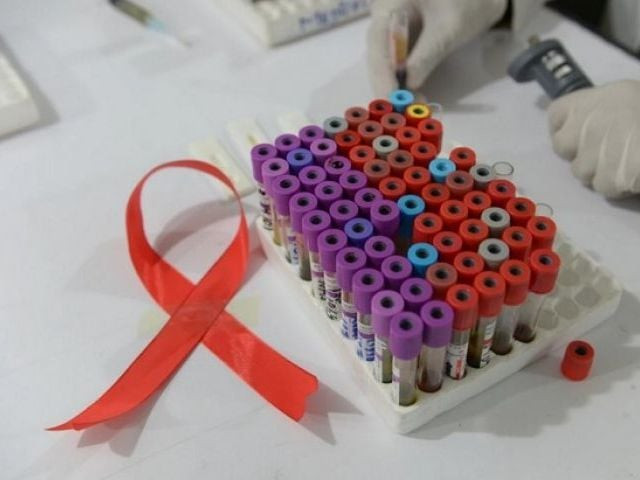Absence of funds: AIDS control programme in K-P left abandoned
Hayatabad Medical Complex has one being run sans govt help

PHOTO: AFP
Officials involved in the AIDS control programme told The Express Tribune it was being run only at Hayatabad Medical Complex (HMC). Global Fund, which had been providing financial assistance to the initiative, has stopped the flow of fund. This is primarily because the PC-1 – which was to be approved in 2014 – has yet to be given the green signal.

As per the officials, the public health section was tasked to support the programme being run at different centres across the province. However, not a single penny has been released by the section. As a result, only HMC decided to take care of the patients after the programme ended in 2014.
Besides offering laboratory facilities, the officials deputed at the family care centre at HMC also offer counselling services.
Over the years, the programme is gradually losing its strength without any assistance being offered, leaving officials concerned to fear the programme’s closure in absence of funds.
Fewer in count
Officials said the number of patients with HIV/AIDS was around 20,000. However, only a few dared to register with the programme centres established. It was said around 2,500 patients have so far reached the centre in Peshawar and Kohat.
Only around 2,200 patients were registered with the facility in Peshawar, they said, while around 250 were at centres in Kohat. The facility at HMC registered around 486 cases in 2015, slightly less than a 100% increase as compared to the 284 cases in 2014. They feared the number will increase by 120% by the end of 2016.
“Around 70% of the fresh registered patients are male, 23% female and 4% children,” Dr Fawad, who represented HMC’s Family Care Center, said during a program at a local hotel on Monday. The program was held by Rehnuma, an organisation offering advocacy services on family planning, reproductive and sexual health. Fawad added around 20% of the patients were people who are transgender, adding the organisation also offered pre-test counselling to convince patients to go for laboratory tests as well as post-tests counselling for treatment.
Fearing stigma
He said a large number of patients refused to go for the lab tests due to the stigma attached to it, because people usually keep those diagnosed with the disease at a distance.
He added most of the patients lost their jobs and friends – even their family members were hesitant to keep in contact with them.
“People always think HIV is transmitted only through sexual relations and most of the times even health experts [doctors] refuse to treat such patients who complain of other illnesses,” Fawad said.
Dr Idrees, who has been dealing with the AIDS control programme in K-P, stated only strong linkages could help reduce the growing number of patients, since it was not an epidemic.
However, he added, privacy of the patients who go for counselling must be considered and their identity should be kept confidential.
“Your words can [make the] patient [go] for another session, but at the same time your words can lead to a suicide attempt,” Idrees emphasised on how important it was to convince a patient for tests as well as treatment against AIDS.
He also said group counseling should not be practised and patients must be dealt with individually.
When contacted, Dr Shaheen Afridi, deputy director of public health section of the health department, said Global Funds was still assisting the programme. She added the provincial government was asked to take the responsibility after the PC-1 could not be approved, but there had been issues and resources were needed to continue with the programme.
She said the government had approved Rs500 million during the fiscal year 2015-16 for an integrated programme (HIV/AIDS and hepatitis), but since some new projects were included, the PC-1 lingered on for a month.
“With the untiring efforts of the health secretary, Abid Majeed, the additional chief secretary was approached and the pre-provincial developmental working party was approved – the funds will be issued in a week or less,” Afridi said.
Published in The Express Tribune, April 26th, 2016.













COMMENTS
Comments are moderated and generally will be posted if they are on-topic and not abusive.
For more information, please see our Comments FAQ